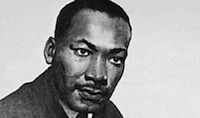Photo: Dr. King Portrait by Betsy G. Reyneau–Wikipediacommons
I was marching on Broad St. and Market St. in downtown Newark, NJ with 100 other people last week on January 15, the day 90 years ago Dr. Martin Luther King, Jr. was born. Following the lead of Larry Hamm, chair of the Peoples Organization for Progress, organizers of this demonstration, we chanted: “What do we want? Justice! When do we want it? Now!;” “Stop Police Brutality in the Black Community;” “Martin Luther King, Live Like Him! Fannie Lou Hamer, Live Like Her! Ella Baker, Live Like Her!” and others.
As we approached the end of the march back at the Martin Luther King statue where we had started, I found myself reflecting on my personal connection to Dr. King. When I was about 15, living in Lancaster, Pa., my father took me to hear him speak at Franklin and Marshall College. Then, a few years later, while a freshman at college in Grinnell, Iowa, I heard him speak again. After he finished, I went up front and shook his hand. About a month later he was dead.
I thought about my father and mother. My dad was active in Lancaster in the desegregation movement, and when Dr. King and SCLC put out a call in 1965 for people to come to Selma, Alabama to take part in the Selma to Montgomery march, he answered the call, going down with others. The main thing I remember about those days is my mom crying as she was saying a prayer before our family dinner one of the evenings dad was away. I think it was the only time I ever saw her cry.
Then there was April 4, 1968, the day King was assassinated. I was very shaken by the news that evening, so shaken that I did something I’d never done before: take action for social change. I wrote up a short petition to Congress, calling upon them to address the conditions Dr. King was trying to change, put it up on the wall the next morning inside the student mailroom, and then sent it off to Congress with about 500 signatures a couple of days later.
It was my first activist action, the beginning of a road as an activist and organizer for progressive, revolutionary change that I am still on and will be to the day I die, God willing.
I’ve heard lots and lots of his speeches and read some of his books, though I really should read more of them, especially his writings toward the end of his life when his experiences fighting for the rights of Black people had led him to realize that what was needed was a movement which united people for fundamental, transformative change in the whole society. For example, here’s one MLK quote, from May 1965 in a speech to the Negro American Labor Council: “Call it democracy, or call it democratic socialism, but there must be a better distribution of wealth within this country for all God’s children.”
Every year this birthday anniversary comes around, and every year I find myself moved emotionally by the things I remember, the speeches and words of MLK’s that I hear or read again, some for the first time. This morning I heard on Democracy Now Dr. King saying, among many other things, that a person who is not prepared to die for what they believe is a person who hasn’t learned what life is all about.
Martin Luther King, Jr., live like him.
Ted Glick has been a progressive activist, organizer and writer since 1968.
Past writings and other information can be found at tedglick.com and he can be followed on Twitter at https://twitter.com/jtglick







